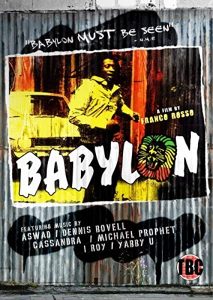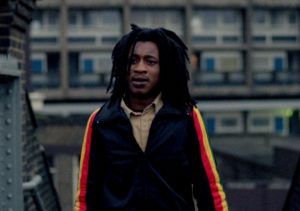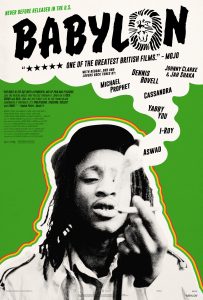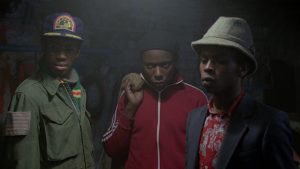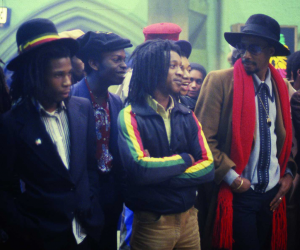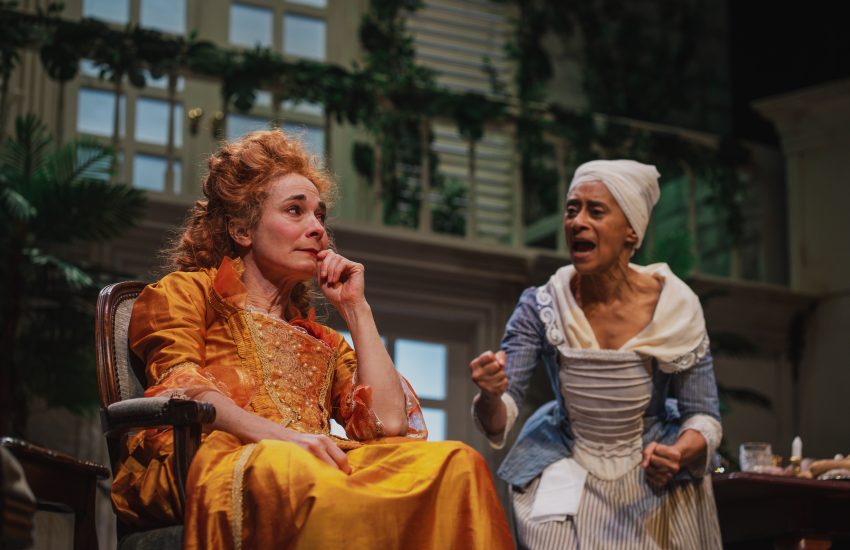BABYLON – FORTY YEARS ON
Written by Tom Pointon
In 2010 I ran a one-day workshop at Gloucester Guildhall Arts Centre entitled ‘Introduction to Black British Film’. Participants explored key concepts and ideas informing current debates around identity, belonging, nationhood and race by watching then discussing specific scenes from several key films. I aimed to give students an overview of the canon of work by or concerning BAME people from the late sixties to the present day. Babylon (Franco Rosso, 1980) was one film we examined and, ten more years on, the fortieth anniversary of its release seems like an opportune moment to reconsider and evaluate the film and ask how things have changed in Britain in the forty years since the film was made.
The film follows Blue / David (Brinsley Forde), a young Black South Londoner who sings and MC’s for the Ital Lion sound system he runs with his friends. A forthcoming clash with rival system Jah Shakah is the background for a bleak, uncompromising drama pushing back against the racism and decline of late seventies Britain.
Situating the film alongside other canonical black British films such as Pressure (Horace Ové, 1974) or Burning an Illusion (Menelik Shabazz, 1981), both of which follow a young person’s journey of self-discovery and political engagement seems obvious, however Babylon differs from these in that any overtly political action is elided.
In common with Isaac Julien’s Young Soul Rebels (YSR) from 1991, Babylon concerns itself with young men finding meaning in their lives through a music subculture, in this case soul rather than reggae. Unlike Babylon,YSR hardly fits the mould of social realism, being set in 1977 and interrogating the nostalgic vision of Queen Elizabeth’s Silver Jubilee year. Rather than emerging from the music scene it’s depicting, it’s a retrospective look back, questioning the collective memories which form a sense of national identity.
While quite distinctive from two other films emerging around the same time, Babylon might helpfully be considered alongside Quadrophenia (1979) and Breaking Glass (1980).
All three feature a young, working class protagonist. All three films have music and an associated subculture as the central force driving the narrative and all deal in their own way with universal human challenges of finding your way in the world, making sense of who you are and where you fit in to the scheme of things.
Quadrophenia was based upon rock band The Who’s concept album of the same title, a low budget drama set against the scooter riding mod scene of the sixties, following a young man’s (Phil Daniels) descent into amphetamine-induced psychosis. Breaking Glass was a musical which launched the career of singer songwriter Hazel O’Connor (she wrote several of the film’s songs which went on to become hit singles). Breaking Glass integrates music (and music video) into the narrative in a different way to Babylon. O’Connor stars as Kate, an aspiring new wave singer-songwriter, engaged and aroused by the changing capitalist world she lives in. Whilst shamelessly plagiarising Fritz Lang’s Metropolis (1927), the film nonetheless remains effective and interesting, sharing with Babylon a conviction in the centrality and transformative power of art and culture. At times disruptive in a Brechtian sense, scenes such as the opening musical number in the tube train operate to jolt the viewer and remind them of the artificiality of what they’re watching. Kate directly singing at the viewer is an effective technique for a film about the artifice and sustained delusion of the music business. Like Babylon, it’s a bleak film, with Britain’s invisible networks of class, privilege and wealth indicated through dress and accent, sustaining power relationships. Manipulated at every turn by industry executives pulling the strings, Kate’s trajectory moves from engagement and idealism to exhaustion, illness and mental breakdown. Danny, Kate’s self-appointed manager (Phil Daniels again), finds his enthusiasm, aspiration and entrepreneurial zeal slowly corroding to world weary cynicism. It also confronts racism head on during one crucial scene, which is a turning point in the film, clearly grounded in actual events and showing the devastating effects of racism upon everyone.
Of the three, Babylon is easily the strongest film by virtue of script and screenplay, higher production values especially in cinematography and a more sophisticated structure. The narrative is complicated with scenes which, whilst not advancing the story, function in other ways such as commentary upon the characters, their psychology and motivations, or else to situate them in their context, making their motivations and actions inseparable from the circumstances in which they live.
The script was originally written for the BBC ‘Play for Today’ series by Franco Rosso (1942-2016) and Martin Stellman. Franco Rosso was born in Italy, coming to England with his parents at eight years old. As a young man he studied art and went on to assist Ken Loach with editing his seminal film Kes (1969). He worked on a number of TV dramas and documentaries throughout his career, with a special interest in those marginalised, outcast and downtrodden. According to the DVD sleeve notes, Rosso considered England his home, but not his native land, an attitude affording him an empathy with immigrant minority groups. Stellman had been involved with youth clubs and community groups, whilst
Saudi-born Mamoun Hassan, another ‘outsider’, was Managing Director of the UK’s National Film Finance Corporation, established in 1951 to promote British film and challenge Hollywood dominance. According to Hassan’s accounts, ideally a Black director would have taken charge of the project, however he suggested that either Rosso or Stellman direct the film, since they knew the milieu from which it emerged and could bring an authenticity, making the film come alive. Cinematographer Chris Menges had also worked with Ken Loach on Kes. His talent at composition and lighting is evident throughout, exploited to the full, reinforcing the interior worlds of the characters, commenting about their circumstances or simply providing visual pleasure for the spectator.
Brinsley Ford was by that time well established in a dual career as an actor and lead vocalist with reggae band ASWAD. Karl Howman, who played Blue’s friend Ronnie, was a well-known regular on British television, as was Trevor Laird who played Beefy. Supporting roles were taken by other professional actors with extras found amongst the reggae and sound clash scene of South London, all giving the film authenticity.
The film operates on several levels. Whilst documenting the specificity of a young, black, male experience in London, it is also a more universal ‘youth’ film expressing the awkwardness of growing up, trying to find your way in the world, casting aside the weight of the previous (your parents) generation and finding your own voice. Times change and what worked for one generation won’t necessarily work for the next. It also offers a portrait of London in the late seventies – a pre-gentrified landscape of bomb sites, derelict streets, mud soaked backstreets, garages and cheap workshops underneath railway viaducts. A shabby city of seedy pubs and pool halls. It holds a mirror up to a country that’s structurally racist, making police abuse and brutality explicit on screen.
Opening and subsequent shots establish this as a London film – a busy street full of traffic, a red London bus and traffic signs indicating Lewisham and Lee Green, shot with a telephoto lens compressing perspective and directing attention to the two central characters – Blue and his friend Ronnie, who’re situated centre frame, running. As the two young men join their friends in the process of loading equipment into a van, there’s a cut to a shot of a train passing over a viaduct, again, the city is unmistakably London. However, this is another London, one in which these young men are taking space, rendered through camera work, which shoots from low angles. Their movement, gait and posture fill the frame and assert their presence – this is unequivocally their city. The omnipresent soundtrack, composed specially by Dennis Bovell, utilising strong reggae basslines, further reinforces this.
The film reportedly didn’t get the distribution it deserved and languished for many years, its availability limited to the odd television showing or bootleg VHS copy, only adding to its mystique and cult following. It should be acknowledged however that the early eighties were the nadir of the British film industry, with cinemas closing, and the rise of home video compounded by long standing indifference on the part of the political and cultural establishment towards film. Subtitled films (which are often considered mainstream in their countries of origin) in Britain have long been ghettoised as ‘art’ films, being shown away from mainstream cinemas. Any film where the characters spoke in patois for the first eleven minutes was bound to present a challenge to distributors notoriously unwilling to take risks. Acceptance of drug taking as the norm, an ambivalent attitude towards criminality and plenty of swearing ensured the BBFC slapped an ‘X’ certificate on the film, further restricting it to an audience of over eighteens. However, in those days one was rarely asked for ID and most teenagers who ‘looked’ eighteen would certainly have been able to see the film.
In an early scene Blue is fired from his job as a mechanic, after arguing with the racist garage boss, who’s asked or rather told him to work through his lunch break. ‘There’s too much of this’ says the man, miming a talking motion with his hand. Reading Reni Eddo Lodge’s polemic Why I’m No Longer Talking to White People about Race, Akala’s Natives or indeed countless opinion columns and blogs, an attitude that black people should keep quiet still prevails.
If belonging is established through the camera work of the opening credits or subsequent scenes such as Dreadhead and Loverboy walking through the market to the record store, around a third of the way through the film brings conflicts around identity and belonging sharply into focus. Having stolen a loudspeaker the boys gather together one night at their lockup garage on a council estate, to hear the new tune. Ronnie, the only white person present, is tolerated, but it’s made clear, through speech (everyone else is speaking patois) and by his declining the spliff being passed round, he’s not fully part of the group. As Dreadhead enters with the new, pre-released tune which they hope will bring them victory over the rival sound system, Ronnie is told to his face ‘this man no Ital Lion man’.
Music is treated in a reverent way with a dedication akin to a religious ritual. The scene is carefully lit, a harsh fluorescent light at the back of the garage contrasting with softer light coming from overhead lamps illuminating the young men’s faces. As they look at the disc, Blue carefully placing it on the turntable and slowly bringing the stylus down, the camera pans backwards slightly, then the turntable fills the shot, emphasising the importance of the disc.
The group start dancing before the scene is interrupted by a neighbour banging on the door. A further indication of the uneasy relationship Ronnie has with the group, tolerated but not really accepted comes when he’s addressed as ‘Boy’ by Dread who peers out. Ronnie has an exchange with the neighbour, an angry lady who ‘knows exactly what’s going on in there…there must be at least six of them in there’.
The woman uses racist language to describe the young men, which Ronnie, in an ironic way, plays along with. Derogatory terms are then expressed before the woman pushes past him into the space. After accusing Ronnie of treachery ‘to your own kith and kin’ she rounds on the group with more racist abuse, swearing. In one of the most powerful moments in the film, Beefy loses his temper, shouting back: ‘This is my country lady, and it’s always been a fucking tip.’
The scene is a perfect example of what Eddo Lodge describes as white privilege. Using racist language ‘ironically’ is another way of demonstrating power. Ronnie enjoys the music, the ‘ganja’, the frisson of hanging out with ‘the blacks’, the ‘edginess’ of being on the fringes of a ready-made subculture. Unlike Blue, his work colleague who’s become his mate, he’ll never have to deal with the lived experiences of oppression to which the ‘herb’ and the music are in part a response. He’s never going to really ‘get’ it. If he loses his job, he won’t encounter difficulty or indeed impossibility when looking for another.
This flaunted privilege eventually becomes too much for Beefy. In a climactic scene he headbutts Ronnie for ‘talking black’. Beefy, by virtue of his blackness, is silenced. Not having a metaphorical voice, fury spilling into violence is the inevitable result.
If Ronnie is a somewhat unsympathetic character, Babylon is nonetheless even-handed, there are decent white people around, such as Len who buys a stolen television and gives a little extra ‘for some sweets’ or the vicar who lends the hall for the engagement party. There’s even the old lady who in a humorous scene castigates Blue when he tries to grab his younger brother in the street attempting to get him to school.
Mood and tone in the film shift constantly, with humour leavening what are otherwise tragic situations. This makes serious parts all the more poignant. The engagement party scene illustrates well how Babylon endures through specificity combined universality. The lads, on entering the church hall, giggle awkwardly when Sandra’s father makes his speech. They’re still essentially boys, not yet ready for the adult world and adult responsibilities. Women are not very present in the film, although Blue has some female love interest. These boys are still at the stage a lot of young males go through. Not so interested in girls (or other boys) so much as an intense relationship with other males through a shared activity.
Tracking shots of the boys set against a grim city scape of vacant lots, boarded up with rusting corrugated steel, fires in braziers, entire rows of derelict terraced houses reinforce the poverty and lack of opportunity of their surroundings. The unattainability of ‘swinging’ London is shown in a later scene when Blue joins two acquaintances who drive up to the West End in their car, ‘just cruising’ – he doesn’t know their motive is to rob a gay man by one of them pretending to be a hustler and is horrified by their violence. ‘It’s survival’, argues one of them before heatedly telling Blue to ‘fucking’ get his stuff out the car. We see the Christmas lights of Regent Street reflected, moving on the car’s windscreen in one of the film’s most effective sequences. The affluent West End of London, the city of opportunities, money and the esteem and status which accompanies it, are intangibles, shifting reflections, dangled in front of your eyes but forever out of reach. Pulling their victim into an amusement arcade, with its gambling games rigged in favour of the house, renders explicit the lottery which is reflective of these young men’s lives.
This is made all the more explicit when Blue’s girlfriend is dropped off at her council flat following a night out, by a man driving a Jensen Interceptor, at that time (and today) a prestige car unaffordable for all but the wealthy. After they argue, he bangs the wall of the lift in frustration. This is a life going up, going down but never really getting anywhere.
It’s the opinion of this writer that in the hands of another director, Babylon might not have been so effective. There’s a certain distancing and objectivity put to work through the film language and full exploitation of cinematic technique that nonetheless directs empathy towards the characters. During the opening scenes the viewer shares the excitement and joy of getting together to enjoy the music. Tracking camera shots at shoulder height situate the protagonists in their surroundings and the viewer sees how the poverty of their environment affects their life chances. Without excusing delinquent behaviour, we see how options and opportunities have closed down.
Brinsley Forde was an inspired choice for lead actor, carrying the film through his presence, charisma and bringing a believability to the part through a measured, nuanced acting style. One can’t but help like this young man. While nonconfrontational, he won’t be pushed about, evidenced by his response to a racist garage boss.
* SPOILER ALERT
However, there’s only so far you can push things and pressure builds in the film towards an inevitable, violent climax uncomfortably prescient of today’s moral panic about knife crime. In 1981, less than a year or so after the films’ release, major riots shook Brixton, South London, not far from where the film was made as well as other cities across the UK, such as Lozells (not Handsworth as is popularly assumed) in Birmingham and St Paul’s in Bristol.
FORTY YEARS ON
Poet, rapper and commentator Akala was born in 1983 and is of the generation which followed after the protagonists of the film. His recently published polemic Natives lays bare the structural racism of the United Kingdom, inextricably entwined with capitalism and Britain’s pernicious class system. He articulates from his own lived experience the effects of racism. He describes how a discourse operates to position black men and especially young black men within crude caricatures and stereotypes. This is shown explicitly in Babylon, when Blue is chased down, beaten up by the police and wrongfully prosecuted.
The notorious ‘SUS’ laws used against Blue in the film have their latter-day counterpart with ‘stop and search’ policies. A recent review of the Metropolitan police’s ‘gangs matrix’ reveals an organisation which continues to be institutionally racist and apparently incapable of any structural change. The far-right National Front has morphed into the lunatic fringe of Britain First and UKIP. More concerning is the degree to which racist ideology has become mainstreamed, to the extent of being articulated by supposed ‘progressives’. The ‘hostile environment’ launched by Prime Minister Theresa May had precedents in the Labour government of 1997-2010, which removed the rights of people seeking asylum to work, replaced financial support with vouchers which could only be redeemed in certain supermarkets, with no change given. Under Labour, one home secretary after another stirred up a discourse around ‘bogus asylum seekers’.
James Hamilton Paterson, born in 1941, is of a very different background and generation to Akala or Reni Eddo Lodge. His recent work What We Have Lost describes how, during the years following World War II, Britain’s industries collapsed, and the country’s assets were sold off. This was enabled by cultural particularities and Britain’s pernicious class system.
Paterson identifies hubris, the notion of exceptionalism, an idea of ‘great’ Britain, that suggests its people believe they are somehow better than everyone else. This delusional self-belief combined with myopic nostalgia for somewhere which never was, has characterised national culture since at least the eighteenth century.
The British education system continues to maintain Britain’s pernicious class system. Exclusive, fee paying schools, selective university placements, followed by careers in law, politics, media, banking and so on for a privileged minority. For the rest, state schools which, as Akala describes, are designed to fail most people, black people especially. Other European countries such as Germany or France, from the nineteenth century on, invested into vocational education. By contrast, Britain has always accorded low status to producing or doing something of value.
Militant trade unions are generally blamed for Britain’s decline. Patterson however identifies lack of innovation, lack of investment in research and development, short term thinking, complacency and poor management as more significant, with trade union intransigence more a response to, rather than a cause of, these factors.
In any case, Britain virtually abandoned manufacturing by the early eighties. The industrial base largely disappeared. ‘Service industries’ took over. Parasitic enterprises consisting of financial products and services.
Neglect of STEM subjects meant home-grown expertise has never emerged, resulting in the inevitable outsourcing of large infrastructure projects to foreign firms. Neglect of foreign languages left British school leavers at a disadvantage compared to their European counterparts who were able to speak English as well as their native tongue. Utilities companies, football teams, airports and plenty of British brands can no longer truly be described as ‘British’, having been sold off to foreign investors.
The one area where Britain has succeeded, cultural offerings and specifically, popular music, is, ironically, under greater threat than ever, owing to BREXIT, a hostile environment and ongoing moral panic about immigration. Several recent articles in the quality press have outlined how increasingly difficult it is for musicians to travel and visit Britain.
London’s and indeed Britain’s vibrant, exciting music scene which has spread to every corner of the globe, owes its very existence to the varied music forms which immigrants brought to its shores.
As shown so clearly in the film, cultural exchange – records (and people) coming in from Jamaica – sustained the roots / reggae scene in Britain during the seventies. It’s hard to imagine Jamaican DJ’s or musicians being able to visit London so easily now.
The racist neighbour tells Blue and his friends ‘this was a lovely area before you came here’.
The title Babylon designates a declining, degenerate civilisation. BREXIT and the associated panics about immigration and bogus asylum seekers are symptomatic of a country deeply ill at ease with itself and what it’s become. However, in a bitter irony, it wasn’t immigrants who reduced Britain to a vassal state owned by oligarchs and hedge funds. It was Britain’s political, managerial and largely upper class which did this to themselves.
Babylon is an appropriate designation for the hollow illusion of a nation projecting fantasies of ‘multiculturalism’ and ‘celebrating diversity’. Forty years on watching Babylon again reminds us how little has improved and how much is arguably even worse.

